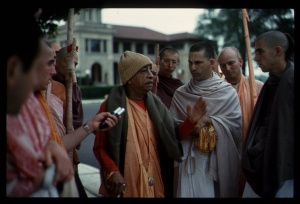CC Madhya 17.134: Difference between revisions
m (1 revision(s)) |
No edit summary |
||
| Line 1: | Line 1: | ||
{{ | [[Category:Sri Caitanya-caritamrta - Madhya-lila Chapter 17|C134]] | ||
<div style="float:left">'''[[Sri Caitanya-caritamrta|Śrī Caitanya-caritāmṛta]] - [[CC Madhya|Madhya-līlā]] - [[CC Madhya 17|Chapter 17: The Lord Travels to Vṛndāvana]]'''</div> | |||
<div style="float:right">[[File:Go-previous.png|link=CC Madhya 17.133|Madhya-līlā 17.133]] '''[[CC Madhya 17.133|Madhya-līlā 17.133]] - [[CC Madhya 17.135|Madhya-līlā 17.135]]''' [[File:Go-next.png|link=CC Madhya 17.135|Madhya-līlā 17.135]]</div> | |||
{{CompareVersions|CC|Madhya 17.134|CC 1975|CC 1996}} | |||
{{RandomImage}} | |||
==== TEXT 134 ==== | ==== TEXT 134 ==== | ||
<div | <div class="verse"> | ||
ataeva kṛṣṇera ‘nāma’, ‘deha’, ‘vilāsa’ | :ataeva kṛṣṇera ‘nāma’, ‘deha’, ‘vilāsa’ | ||
prākṛtendriya-grāhya nahe, haya sva-prakāśa | :prākṛtendriya-grāhya nahe, haya sva-prakāśa | ||
</div> | </div> | ||
| Line 12: | Line 16: | ||
==== SYNONYMS ==== | ==== SYNONYMS ==== | ||
<div | <div class="synonyms"> | ||
''ataeva''—therefore; ''kṛṣṇera''—of Lord Kṛṣṇa; ''nāma''—the holy name; ''deha''—the spiritual body; ''vilāsa''—the pastimes; ''prākṛta-indriya''—by the dull senses made of matter; ''grāhya''—perceptible; ''nahe''—not; ''haya''—are; ''sva-prakāśa''—self-manifested. | |||
</div> | </div> | ||
| Line 19: | Line 23: | ||
==== TRANSLATION ==== | ==== TRANSLATION ==== | ||
<div | <div class="translation"> | ||
"The holy name of Kṛṣṇa, His body and His pastimes cannot be understood by the blunt material senses. They are manifested independently. | |||
</div> | </div> | ||
| Line 26: | Line 30: | ||
==== PURPORT ==== | ==== PURPORT ==== | ||
<div | <div class="purport"> | ||
Since Kṛṣṇa’s transcendental body, name, form, qualities, pastimes and entourage are all the Absolute Truth, they are as good as Kṛṣṇa Himself (sac-cid-ānanda-vigraha ( | Since Kṛṣṇa’s transcendental body, name, form, qualities, pastimes and entourage are all the Absolute Truth, they are as good as Kṛṣṇa Himself (''sac-cid-ānanda-vigraha'' (BS 5.1)). As long as the living entity is conditioned by the three modes of material nature (goodness, passion and ignorance), the objects of his material senses—material form, taste, smell, sound and touch—will not help him understand spiritual knowledge and bliss. Rather, these are revealed to the pure devotee. One’s material name, form and qualities are certainly different from one another. In the material world, there is no conception of absolute; however, when we come to Kṛṣṇa consciousness we find that there is no material difference between Kṛṣṇa’s body and His names, activities and entourage. | ||
</div> | </div> | ||
__NOTOC__ | |||
<div style="float:right; clear:both;">[[File:Go-previous.png|link=CC Madhya 17.133|Madhya-līlā 17.133]] '''[[CC Madhya 17.133|Madhya-līlā 17.133]] - [[CC Madhya 17.135|Madhya-līlā 17.135]]''' [[File:Go-next.png|link=CC Madhya 17.135|Madhya-līlā 17.135]]</div> | |||
__NOTOC__ | |||
__NOEDITSECTION__ | |||
Revision as of 14:07, 24 October 2021

A.C. Bhaktivedanta Swami Prabhupada
TEXT 134
- ataeva kṛṣṇera ‘nāma’, ‘deha’, ‘vilāsa’
- prākṛtendriya-grāhya nahe, haya sva-prakāśa
SYNONYMS
ataeva—therefore; kṛṣṇera—of Lord Kṛṣṇa; nāma—the holy name; deha—the spiritual body; vilāsa—the pastimes; prākṛta-indriya—by the dull senses made of matter; grāhya—perceptible; nahe—not; haya—are; sva-prakāśa—self-manifested.
TRANSLATION
"The holy name of Kṛṣṇa, His body and His pastimes cannot be understood by the blunt material senses. They are manifested independently.
PURPORT
Since Kṛṣṇa’s transcendental body, name, form, qualities, pastimes and entourage are all the Absolute Truth, they are as good as Kṛṣṇa Himself (sac-cid-ānanda-vigraha (BS 5.1)). As long as the living entity is conditioned by the three modes of material nature (goodness, passion and ignorance), the objects of his material senses—material form, taste, smell, sound and touch—will not help him understand spiritual knowledge and bliss. Rather, these are revealed to the pure devotee. One’s material name, form and qualities are certainly different from one another. In the material world, there is no conception of absolute; however, when we come to Kṛṣṇa consciousness we find that there is no material difference between Kṛṣṇa’s body and His names, activities and entourage.